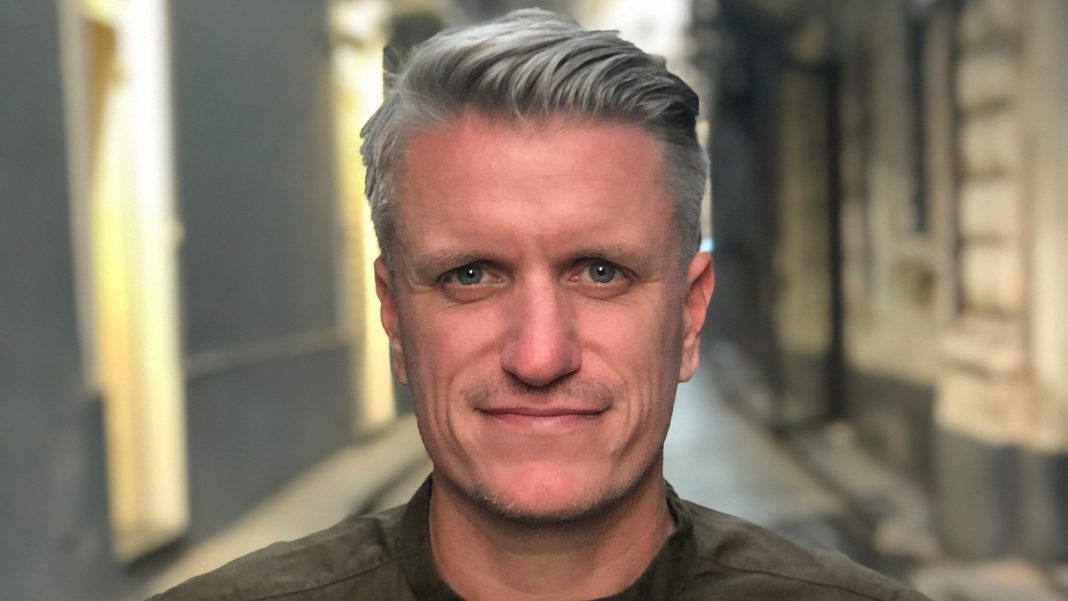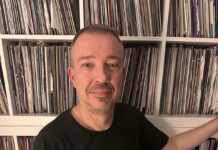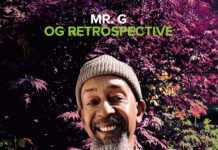
Photo: Press (Kyle Geiger)
Techno is based on two intertwined promises: that of community and that of technological progress. When coming together in the physical realm becomes an impossibilty, innovation becomes more crucial than ever. Kyle Geiger has dedicated his life to techno and has not been deterred by the accelerated standstill the global dance music scene has found itself in for the past months. In fact, he seems more busy than ever, organising Twitch streams and trying to find ways to build communities when our traditional understanding of the social experience is being tested. It’s perhaps no surprise then that his mix for the Groove podcast aims to highlight the work of those who continue to push envelope.
First off, how have you been doing these past months?
I think I have been doing well, in pandemic adjusted terms. Sometimes I feel guilty for saying this, and sometimes I feel like I’m just not fully grasping the weight of everything going on. But honestly, I consider myself lucky with regards to the core things like health, both mentally and physically. Also, having community and family that I can always reach out to is something I’m really thankful for.
So far, you have not released any music in 2020. Was that a conscious decision or just a mere coincidence?
I feel like there’s probably a better answer for this, but I’d say it was a combination. I was kind of questioning the value of throwing more music into the void in the name of getting a couple extra days of social media mileage. I’m always writing music, and always creating music to play in my DJ sets, and I have fun making music that isn’t really for DJing as well. I think I had just gotten to where I’d felt like releasing music was something that was a pointless exercise in the current environment with the way music is released and consumed. While there’s a lot of truth in those feelings, I think it was a really bad attitude to have. I also think there was fear and insecurity that was wrapped up in it as well, which I needed to confront. But then when the whole COVID-19 thing exploded, it just wasn’t something I gave a lot of thought to, and it wasn’t really intentional. But, I can say that, provided that Mariah Carey doesn’t decide to press 100,000 copies of a last minute Christmas album on vinyl, I do have an EP that should be in line for release before the end of the year. If the pressing plant has delays, then we can see its release in February! It’s a four-track release called the Bellhouse EP on Made of Concrete, with 3 originals, and a really nice remix from the Rebar guys. I actually featured a couple tracks from it in the mix! Also, I just completed a remix for an up and coming artist named Alias 1 from Malta, on a label that’s ran by another Maltese scene staple. This will come out on Solid Tracks by the end of November. This remix was made from start to finish on Twitch actually. It is the first of many that have been entirely produced “on air”, so expect more of these!
Already in March, you started hosting live streams on Twitch, giving workshops and having chats with other artists under the title „Conversations & Collaborations.“ What prompted you to do all this?
Basically, I knew we were heading into some pretty strange times, and creating music was always a healthy distraction for strange and uncertain times in life. I was humbled by the swift government support artists initially got in Germany, and it just seemed like a practical way to make myself useful and give back. It was really an accident with what it grew into, but I’m very happy with it. I really thought when I offered to help people get started with making music, I’d get a few emails with some questions and that’d be it. Of course, that lead into something else. I thought maybe doing workshops showing the basics would be useful, and people responded. Then with Twitch, it honestly started because a few people didn’t have Facebook accounts, so I created an account for them. Then I started using Twitch as a really informal platform as a contrast to the more structured workshops I was doing on Facebook. I figured I could just invite people into my studio on Twitch, and they could virtually look over my shoulder while I worked on music, without trying to polish the process in any way. I work on a lot of music, but sometimes I just want to watch stupid YouTube videos for 15 minutes. I’ll maybe update software, listen to promos, and obviously there are times when my computer needs to be sworn at very loudly, and people are always welcome to ask questions about any of the processes. I also really try to just facilitate community on the channel. Everyone is dealing with this pandemic in different ways, and hopefully this little routine we’ve formed together as a community is something we can look forward to even when it’s been a crappy day or week. „Conversations and Collaborations“ was really just me expounding on that idea. I always love having friends over or in the studio, and I thought it made sense to let people get to know my friends, colleagues, and acquaintances. It’s all really exciting for me, and it’s so relieving since the pandemic to not have to convince every person it’s the right PR move or something that will give their career a certain amount of mileage. It’s not for everyone, and there’s never hard feelings to anyone who doesn’t have interest in doing it. The offer is always there to hang out off camera as well!
For „Focus on Brazil,“ you speak to local producers, DJs, and scene figures from the country. What was your idea behind that „mini-series,“ as you have called it?
These conversations started by accident. My good friend Moe a.k.a. Drumcell had a special talent for always calling me while I was streaming, and one time I just answered the call and told him to be careful because he was on the air. I don’t even remember what we spoke about, but somehow people stuck around and listened and even came up with questions for him while I was on the call. I started thinking, I can call anyone and talk to them about anything, and I really like learning about other people’s lives. Twitch has been amazing for me to live out my curiosity about all kinds of things. The internet can be a very cynical place, and sometimes we have to act like we know everything about everything. I don’t want to ask questions about things that I already know about, I want to learn more about things I’m curious about. I originally come from a place that has so many incredible local DJs. These are DJs who are well known locally, but lots of people elsewhere never get to hear about them. I started thinking about things I wanted to learn about but didn’t know much about. I got to know Amanda Mussi a couple years ago and thought she was playing very interesting music, and also seemed to have a pretty cool approach to everything. Every artist and DJ begins locally, and I thought it’d be fun to virtually travel to where an artist is and discover their local world, not just in club and music terms either. I always looked up to Renato Cohen as well, and then just started connecting the dots. Then, I thought it’d be really interesting to find that one act that is super important in the local/regional/national scene who maybe isn’t known about within my circle of influence. The plan was always to resume these once the in-person „Conversations and Collaborations“ became too risky based on local COVID-19 numbers. Unfortunately, we have arrived at that point, but I’m also excited to explore more local scenes and get to know some of the people that makes those scenes tick.
You also use Twitch to generate revenue, offering exclusive content and plug-ins amongst other things to anyone who subscribes. What experiences have you made with this model so far? Would you say that it could be a feasible alternative for producers and DJs who are currently without income?
I consider myself really lucky, and I have some incredibly generous people in our little community. Twitch just felt very natural for me. I talk to some people about it, and they’ll just be like, “That sounds miserable… but cool it’s working out for you!” It’s not for everyone, but I also would say there’s a way broader range of what you can do on Twitch than what you can do in the traditional techno industry. Some people on Twitch just produce music the whole time, no mic, no nothing. Others do some pretty far out stuff, and there’s tons in between. I love that it’s a platform that’s completely disconnected from the industry we are a part of, and so you don’t have to reverse-engineer it to cater to your industry. Instagram has a super obvious aesthetic. It’s pretty clear that a strong Instagram presence helps your chances in the industry, and it’s even more obvious what Instagram wants you to post to boost that presence…so it becomes an incredibly predictable feedback loop. Musically speaking, Twitch is still really young, cool and relevant aren’t dictated by Instagram or other social platforms, and the playing field is more or less equal. I can’t tell you how many people are doing really cool shit on Twitch who haven’t really had much exposure in the club circuit. One of my favorites in this category would be a user named metronomic_live. He rarely plays in clubs, and has an incredible following from doing these sunrise and sunset sets overlooking New York City on Twitch and has built a really solid following doing this. Regarding income, it’s like anything: it depends. It’s actually a lot like DJing. Maybe you show someone a gig fee and they say, “Wow, that’s incredible!” But this assumes that you really love what you do. If you hate it, hate traveling, hate late nights, etc., the total time invested per gig up against the pay doesn’t make sense for most people. Of course, there are famous Twitch people making millions, but it’s not like you can just decide to hop in and become a distinct outlier. Also, worth noting is that the ones making the big bucks are mostly gamers who often have more viewers in their stream than the entire music category in Twitch usually does. I also find that Twitch is a unique environment or platform that takes some explaining to people before they catch onto the culture and “etiquette” of it all. That said, I love it, and I love the interaction of it, so the money is a nice bonus.
Before the pandemic put a grinding halt to the international dance scene, you had started booking your own gigs independently. Why did you decide to do that and, looking back, how well did it work out for you?
I think it’s a personal thing. I think people are programmed to say “I need an agent,” but I’d always encourage everyone to outline what they’re hoping to achieve by this, because it often doesn’t really align with what most agents do. Agents can play a super important role in the industry, and there are plenty of people who need one. But I think there’s a pretty unclear understanding of what most agents offer and what they’re capable of doing. This results in a lot of artists being disappointed because they put unfair expectations on agents. People also forget that one of the biggest reasons that some absolutely need an agent is to have a barrier between themselves and the promoter. If you’re on the road three times a week, it’s probably in your interest to have a middle person. But, that go-between can be a hinderance for some. Lots of the gigs I play, I have a long personal relationship with the club or promoter. It can be weird to tell someone I’ve known for 10 years to talk to a complete stranger to invite me to their city. There’s other times where I say, “I sure wish I had a middle person on this one!” Luckily I’ve got a few friends who help me out from time to time if it’s a booking I’m unsure about. For your average DJ, contracts mean far less than that person’s reputation. Some things don’t need to be formalised, some things do. At the end of the day, it’s a personal choice based on a lot of factors, and I’ve never had a hardline stance on the issue, but it’s been working pretty well for me. The best part of doing my own bookings? When I don’t get booked, I always know whose fault it is!
You have not played any gigs since January, only DJing occasionally on Twitch or for an episode of HÖR in Berlin. Would you say that you approach DJing differently from when you used to play in clubs and do you think your style could change over this in the long run?
I think it’s made me focus more on re-discovering tracks from my own library. It’s incredible how many tracks I have that I’ve never gotten to play in a club. But in general, I’m still playing the stuff I love, and I haven’t released a single ambient set. Ha!
What was the idea behind your contribution to the Groove podcast?
Funny enough, I stay way more current on promo music now than I did when clubs were open. I generally review the music I get through promo live on Twitch, and I really respect people who are still releasing music despite all dance floors being closed for the foreseeable future. So this mix is one that I wanted to be leaning heavily towards new music that maybe hasn’t gotten the maximum impact it deserves due to clubs being closed. Especially with “normal” sources of income being cut off for artists and DJs, it’s also my way of showing appreciation to all those who still give me opportunities to have new music to discover and DJ with. This has been a real gift. The best news is, that it was entirely possible to not remotely compromise the quality level of music with a bit narrower of a focus, and that’s a great sign for how high the bar is with people making and releasing stuff right now.
Last but not least: What are your plans for the future?
This is strange, because I paused answering these questions on Election Day with the plans of answering the following day. There were two questions left, and this was one of them. Tuesday night, my future plans as an American were looking incredibly in question, and now it feels like there are a lot more options moving forward. On a personal level, there are lots of big life changes on the immediate horizon. I will become a father for the first time any day now, which I guess means we need to decide on a name for him. Minor details. We’re very excited about it, and it’s somehow provided contrast to the incredible uncertainty that the COVID-19 situation brings. Our next three to four months are pretty much decided for us, pandemic or not. But, obviously it’s very hard to plan beyond that with the current situation, as there are just too many unknowns. Musically, there is tons of stuff happening. As a result of Twitch, I’ve created more music than I ever have in the past, and I’ve really become a huge believer in working to restore the communal aspect of our music that had maybe been a little overshadowed by the industry aspects, pre-pandemic. It’s taught me that sharing “secrets” and exchanging information about our creative process really only stands to make us better. We are taught to not share our secrets, lest we lose our “edge.” Honestly, if the only thing that makes your music stand out is a way you use a reverb or a delay, it’s probably going to be short-lived anyway. In the spirit of all this, I will be starting a new label, and I have plans to make it more communal than maybe the conventional create, release, and consume model. The process and concept will flow in two directions instead of one, and it’s almost there. Obviously, the more people you involve, the more ways there are for something to go wrong, but I also think there are abundantly more paths for something really special to happen. But basically, much more music, and hopefully a real community around it. I’m really excited about this, and I’ll keep you posted on the specifics in the near future!
Stream: Kyle Geiger – Groove Podcast 280
01. Blue Hour – Mira’s Theme (Reprise) (Blocaus)
02. Kwartz – Ground Contact (K S R)
03. JSPR – Blossom (Second State)
04. Phyxix – Fabryk (Phyxix)
05. Kyle Geiger – Bellhouse 2 (Made of Concrete)
06. Dustin Zahn – Serpenti
07. VHS – 2 (Hayes)
08. Endlec – Heavy Hifter (Analogue)
09. Hemka – Trapped in Paintings (Symbolism)
10. The Lady Machine – Resilience (Token)
11. Dawn Razor/Confluence – Nightfall (Original Mix) (Credo)
12. Philipp Gorbachev – I Am Saved (Marcel Dettmann Hunter Version) (PG Tune)
13. Gabriella Vergilov – The Freak Show (Enemy Records)
14. Gene Richards Jr – Shake Sequence (WRKTRX)
15. Alden Tyrell – Poly Zes (Original Mix) (Clone Basement Series)
16. Casual Treatment – The Intruder (Quartz Rec)
17. A Thousand Details, stndrd – Irokusaykaro (Vohkinne Remix) (ATD)
18. Jerm – Blue Steel (Analogue)
19. Bernardo Hangar – Yad Tahat Yad (Alleanza Recordings)
20. Introversion – Night Terrors (ARTS)
21. Victoria Mussi – This Was (Inbetween)
22. Kyle Geiger – Bellhouse l (Made of Concrete)
23. Benjamin Damage – Remote Viewer (Figure X)
24. James Ruskin – Nepte (Original Mix) (Tresor Records)




